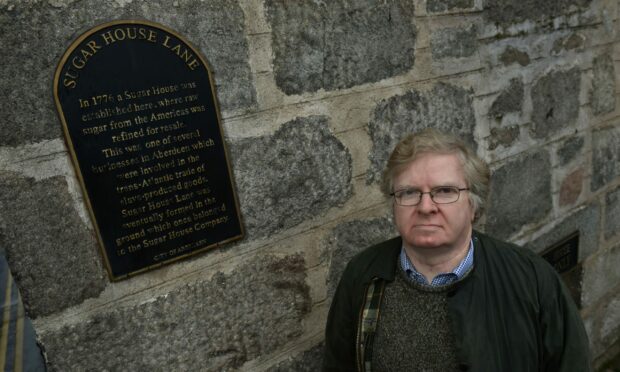Aberdeen’s sordid part in global slavery could yet go unacknowledged – as council chiefs appear deterred to mark it because of a hefty price tag.
Proposals for information plaques revealing how the Granite City had profited from the slave trade first emerged in December.
Since then, Town House bosses have estimated the project – suggested at a time the world introspectively began to look at the historic exploitation of enslaved Africans – would cost the taxpayer £141,600.
There remains only one heritage plaque, in Sugarhouse Lane down by the harbour, which touches upon the city’s role in slavery.
A refinery was based there until the end of the 18th Century.
Commissioning director Gale Beattie said: “A thorough investigation of Aberdeen’s role in slavery to identify locations requires dedicated staff time to undertake historical research and access to the records of private bodies such as the Society of Advocates and the Incorporated Trades, in addition to public archives.
“Historical research is within the skill set of existing officers at this grade however they are required to work across multiple programmes and are therefore unable to replicate the academic rigour of dedicated research staff.
“This work is never ‘finished’, as new sources of information continuously come to light.”
Council counts cost of Aberdeen slavery plaques
Her report being put to councillors next week suggests it would cost tens of thousands of pounds to uncover the lesser known connections.
Council in-house historians have identified 16 sites so far as candidates for plaques.
Of those, 11 – including Leslie Street, Fraser Court, Jamaica Street, Virginia Street and the grave of former Aberdeen MP Alexander Allardyce – commemorate slave traders, places and products.
The remaining five highlight prominent figures and sites important to the abolitionist movement – such as Beattie Avenue, Marischal Street and King’s College.
Aberdeen University is currently permanently employing a lecturer to solely look into how the ancient institution benefited from the slave trade – which, along with previous council work in 2007, informed council staff drawing up their list.
Drafting in a similar historical expert – exclusively working to uncover Aberdeen’s slavery legacy – would cost the city more than £80,000.
Another £50,000 would be needed to get necessary permissions to put up the plaques, officials estimate.
They also reckon around a third of their requests to mount the signs on private properties would be refused, going by recent experiences.
‘Clearly disappointed’: Yuill ‘surprised’ Aberdeen council bosses unmoved by slavery plaque idea
Liberal Democrat leader on the council, Ian Yuill, pressed for the plaques, as a means of the city “fronting up to links to the horror of slavery”.
Balking at the suggested cost, he said: “Just because you can’t do everything doesn’t mean you can’t do something.
“I am clearly disappointed that council staff are proposing that no action is taken on this and, to say the least, I am surprised that it is suggested an academic would have to work full-time for two years to carry out the research needed.
“There are a number of streets in Aberdeen, such as Virginia Street, Jamaica Street and Cotton Street, whose names are clearly linked to slavery and slave products.
“I cannot see why the council cannot erect a commemorative plaque or signs on streets such as these now and then add further plaques or signs on other streets as more information becomes available in future.”
Officials have asked councillors not to pursue the plaques at this time, instead recommending staff be allowed to continue monitoring research and to look at funding for wider work in the city on the history and legacy of slavery.
Councillors will vote on the plans next week.
